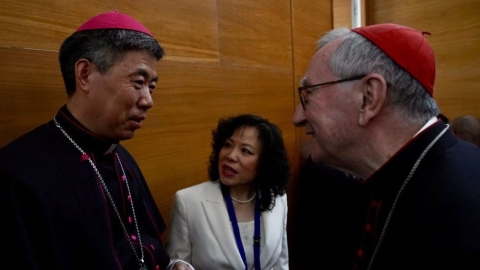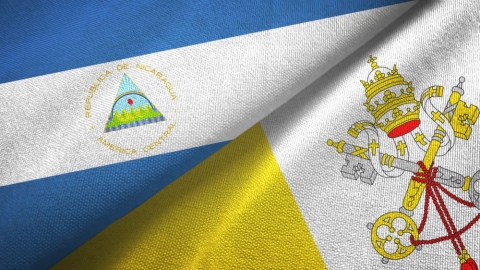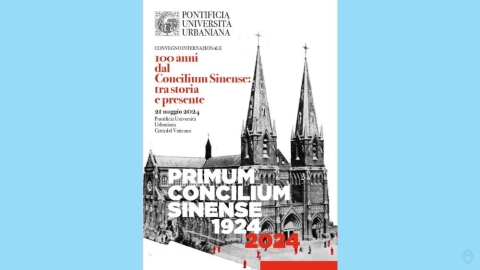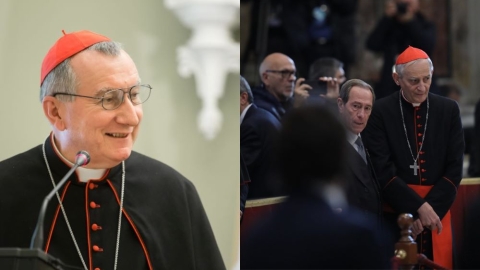War in Ukraine: Controversy After the Pope's Remarks

Pope Francis during the video link with participants of the 10th National Meeting of Young Catholics in St. Petersburg
By referring to the Tsars Peter the Great and Catherine II, as well as to “the heritage of Mother Russia,” Pope Francis aroused the ire of the Ukrainian government and the Ukrainian Greek Catholic Church, creating a controversy which the Holy See could have done without during its attempts to mediate between the parties in a conflict which is bloodying part of Europe.
Ex abundantia cordis os loquitur [for out of the abundance of the heart the mouth speaketh]. We know how much Pope Francis applies this adage taken from St. Matthew (12:34) to his public remarks, often far removed from the speeches carefully prepared and re-read by the Secretariat of State.
A few weeks ago, the Pontiff surprised journalists accredited to World Youth Day by improvising a speech that had nothing to do with the text that officials from the Roman Curia had sent them a few hours earlier. But freedom of speech involves certain risks, as the Holy Father experienced.
The latest incident to date, August 25, 2023, was when the Pope addressed the young Russian Catholics gathered in St. Petersburg, Russia. The Successor of Peter urged them not to forget the heritage bequeathed by Peter the Great and Catherine II, whom he called the rulers of “that great, enlightened Russian empire, of so much culture, so much humanity.… You are the heirs of the great Mother Russia.”
They were comments that did not appear in the official transcription published by the Vatican, but which were indeed mentioned by the Diocese of Moscow and later in the video published by the Catholic channel on Siberian television. They were enough to throw a chill on Eastern Europe.
In itself, the remarks may seem like nothing dramatic, until one takes into account the warlike context that this part of the Old Continent is currently experiencing. Tsar Peter the Great is known, under his reign, to have extended Russian territory militarily at the expense of his immediate neighbors. This expansion also came at a cost to Greek Catholics, many of whom were forcibly united to the Russian Orthodox Church.
As for Catherine the Great, history textbooks most often emphasize her “imperialist aims,” not to mention the fact that the term “Mother Russia” often comes up in the mouth of the current master of the Kremlin.
In short, the land had been mined, and the explosion was not long in coming. Outrage appeared on social networks first, and then from the mouth of the Ukrainian authorities, who jumped at the chance to condemn what they consider to be a flagrant offense of “imperialist propaganda” by the Pope.
Even the leader of the Ukrainian Greek Catholic Church in Rome, Patriarch Sviatoslav Shevchuk reacted negatively: “The examples used by His Holiness do not actually correspond to his magisterium on peace. ...We are waiting for an explanation of the situation from the Holy See,” the Patriarch said.
These critical responses prompted the Vatican had to once again try to make-up for the situation, initially via the Kyiv nunciature, which “rejects the accusations made” against Pope Francis, who apparently “never encouraged either imperialism or colonialism.”
It is a position reiterated by the director of the Holy See's press office, Matteo Bruni: “In the words of greeting addressed off the cuff to some young Russian Catholics in recent days, as is clear from the context in which he pronounced them, the pope intended to encourage young people to preserve and promote all that is positive in the great Russian cultural and spiritual legacy, and certainly not to exalt imperialist logics and government personalities, cited to indicate some historical periods of reference.”
It was a diplomatic faux pas, some will say, which comes at a time when the Ukrainian army, largely supported by NATO, is struggling to regain the advantage on the ground, and when Russia seems to be showing diplomatic openness, as shown by the return Ukrainian children to their country.
It is an openness that the Sovereign Pontiff readily recognizes and wishes to encourage in order to put an end to a butchery that has lasted too long. But there, as elsewhere, the road to hell is often paved with good intentions.
Related links
(Sources : Politico/Il Fatto Quotidiano – FSSPX.Actualités)
Illustration : © Vatican news





